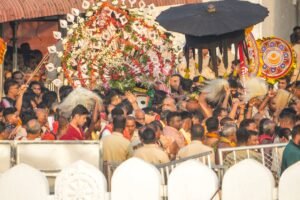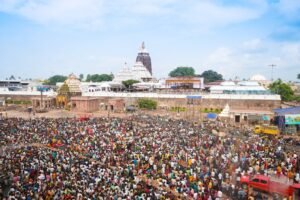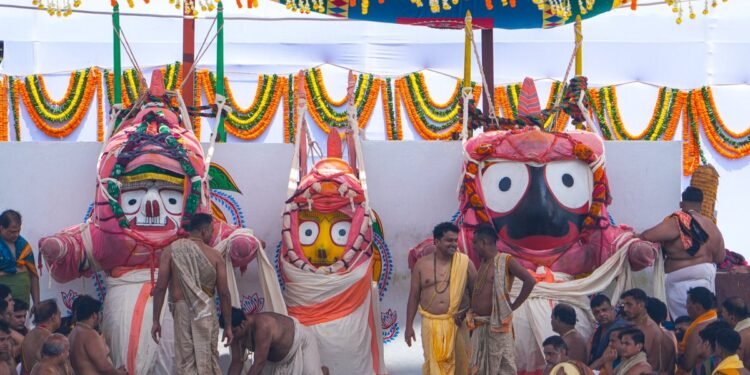Puri (Odisha)- A spiritual wave swept through the holy town of Puri on Wednesday as lakhs of devotees thronged the sacred precincts of the Shree Jagannath Temple to witness the revered Snana Yatra — the ceremonial bathing ritual of the sibling deities Lord Jagannath, Lord Balabhadra, Devi Subhadra, and Sudarshan. The ritual, held on “Debasnana Purnima”, marks an important occasion in the religious calendar of Odisha and serves as the ceremonial prelude to the world-famous “Rath Yatra”, which will be held this year on June 27.
Amid chants of “Jai Jagannath” and the scent of sandalwood and flowers wafting through the temple air, the deities were brought to the “Snana Mandap” (bathing altar) in a grand “pahandi bije” procession that began around 5 am. Chief Minister Mohan Charan Majhi and Puri MP Dr. Sambit Patra were among the many who gathered on the Bada Danda — the Grand Road — to witness this awe-inspiring event.


The Snana Yatra, observed on the full moon day (Purnima) of the Jyeshtha month in the Hindu calendar, is a celebration of divine purity and tradition. Preparations commenced late Monday night when the “Daita” servitors took charge from the temple’s regular priests. These hereditary servitors play a crucial role during this time, guiding every ritual with precision and devotion passed down over generations.
To prepare the deities for the physically taxing “pahandi” procession, a special armor known as “Senapatta”, crafted from “Baula” wood, was attached to the idols on Tuesday night. Meanwhile, massive ladders (Charmalas) were fixed to the “Ratna Singhasan” (jeweled throne) to help transport the idols safely.
Once the deities were ceremoniously placed on the “Snana Bedi”, an east-facing elevated platform overlooking the Grand Road, a sequence of morning rituals — “Mangalalati”, “Mailam”, “Tadap Lagi”, and “Abakash” — were performed. These rituals signify the sanctification of the deities and the space before the central rite — “Jalabhisheka” — the holy bath.
The central ritual of Snana Purnima is the sacred bathing ceremony. According to temple tradition, 108 pots of holy water are drawn from the temple’s “Suna Kua” (Golden Well), a source tapped only once a year on this day. Before being used, each pot is purified with turmeric, sandalwood paste, and fragrant flowers.
A designated group of priests known as “Suaras” are responsible for carrying these pots to the “Snana Mandap”. Each deity is then bathed meticulously: Lord Jagannath with 35 pots, Lord Balabhadra with 33, Devi Subhadra with 22, and Sudarshan with 18.
Following the holy bath, “Mailum” (changing of garments) and “Sarbang” (ritual cleansing of the entire body) rituals were observed. The deities were then adorned in fresh attire, radiating divine grandeur.
The sacred ritual reached a moment of spiritual crescendo with the arrival of Puri’s Gajapati Maharaja Dibyasingha Deb. In keeping with tradition, the Gajapati — considered the first servitor of Lord Jagannath — performed the revered “Chhera Pahanra” ritual, where he sweeps the Snana Bedi with a golden broom as a mark of humility and devotion.
Soon after, the sibling deities were dressed in the “Hati Besha” — the elephant attire — symbolizing Lord Jagannath’s manifestation as Lord Ganesh. This spectacular transformation is a rare sight and draws thousands of devotees for the “Sahana Mela” (public viewing), which began at 7.30 pm.
For millions of devotees, witnessing the Lords on Snana Purnima is more than a religious ritual — it is a spiritual cleanse. It is believed that a glimpse of the deities in their “Hati Besha” form on this day absolves one of sins and brings divine blessings.
The significance of this day also lies in what follows. After the ritual bath, the deities are believed to fall ill — a divine ailment known as “Anasara”. They are kept away from public view and given Ayurvedic treatment until they reappear rejuvenated during the “Netra Utsav” (eye-festival), just before the Rath Yatra.
Puri transforms into a cultural and devotional epicenter during this period. From early morning bhajans and conch shells to the disciplined orchestration of age-old rituals by servitors, every element resonates with deep-seated faith and vibrant heritage. Street-side shops selling flowers, sacred threads, and Jagannath memorabilia create a spiritual carnival that blends faith with festivity.
As the sun set over the Bay of Bengal, casting a golden glow on the temple spires, the chants of “Haribol!” continued to echo — reaffirming the timeless devotion of millions towards the Lord of the Universe.
Snana Yatra 2025 thus not only marked the ceremonial beginning of the chariot festival season in Odisha but also served as a powerful reminder of the rich spiritual fabric that holds the people of this land together. In an age of change, these rituals remain eternal — connecting the mortal with the divine.






